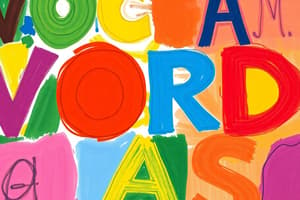Podcast
Questions and Answers
What is the primary difference between active and passive vocabulary?
What is the primary difference between active and passive vocabulary?
- Passive vocabulary includes words that modify the meaning of others.
- Active vocabulary includes words recognized but not used.
- Active vocabulary consists of words used in speech and writing. (correct)
- Passive vocabulary consists of words used in speech and writing.
Homophones are words that have different meanings but sound the same.
Homophones are words that have different meanings but sound the same.
True (A)
What term describes a phrase whose meaning cannot be deduced from its individual words?
What term describes a phrase whose meaning cannot be deduced from its individual words?
idiom
The study of the origin of words is called __________.
The study of the origin of words is called __________.
Match the vocabulary terms with their definitions:
Match the vocabulary terms with their definitions:
Flashcards are hidden until you start studying
Study Notes
Vocabulary
-
Definition: Vocabulary refers to the set of words known and used by a person or group.
-
Types of Vocabulary:
- Active Vocabulary: Words that are used in speech and writing.
- Passive Vocabulary: Words recognized and understood but not actively used.
-
Word Formation:
- Roots: The base part of a word (e.g., "bio" in "biology").
- Prefixes: Added to the beginning of a word to alter its meaning (e.g., "un-" in "unhappy").
- Suffixes: Added to the end of a word to change its form (e.g., "-ing" in "running").
-
Synonyms and Antonyms:
- Synonyms: Words with similar meanings (e.g., "happy" and "joyful").
- Antonyms: Words with opposite meanings (e.g., "hot" and "cold").
-
Context Clues: Hints within a sentence that help deduce the meaning of unfamiliar words.
-
Homophones: Words that sound the same but have different meanings or spellings (e.g., "pear" and "pair").
-
Idioms: Phrases with meanings not deducible from individual words (e.g., "kick the bucket" means "to die").
-
Collocations: Common combinations of words (e.g., "make a decision" vs. "do a decision").
-
Learning Strategies:
- Flashcards: Useful for memorizing definitions and examples.
- Reading Widely: Expands vocabulary exposure.
- Practice: Using new words in conversation and writing enhances retention.
-
Word Games: Activities like Scrabble or crossword puzzles can make learning fun and engaging.
-
Etymology: Study of the origin of words, which can provide insights into their meanings and connections.
-
Register: Variation in language use depending on context (e.g., formal vs. informal vocabulary).
Vocabulary Overview
- Vocabulary consists of the collection of words that an individual or group knows and utilizes.
Types of Vocabulary
- Active Vocabulary: Encompasses words frequently employed in both speaking and writing.
- Passive Vocabulary: Includes words that are recognized and understood but not often used.
Word Formation
- Roots: Fundamental parts of words that convey primary meanings (e.g., "bio" meaning life in "biology").
- Prefixes: Affixes added at the start of words to modify their meanings (e.g., "un-" indicating negation in "unhappy").
- Suffixes: Affixes added to the end of words to alter their grammatical function (e.g., "-ing" indicating ongoing action in "running").
Synonyms and Antonyms
- Synonyms: Words that have similar meanings, such as "happy" and "joyful".
- Antonyms: Words that express opposing meanings, like "hot" versus "cold".
Context Clues
- Context clues are hints present in sentences that assist in unraveling the meanings of unfamiliar words.
Homophones
- Homophones are words that share the same pronunciation but differ in meaning or spelling (e.g., "pear" and "pair").
Idioms
- Idioms are expressions whose meanings cannot be directly inferred from their individual words (e.g., "kick the bucket" implies "to die").
Collocations
- Collocations refer to frequently used word combinations that sound natural together, such as "make a decision" instead of "do a decision".
Learning Strategies
- Flashcards: Effective tools for memorizing meanings and examples of vocabulary.
- Reading Widely: Increases exposure to diverse vocabulary and contexts.
- Practice: Incorporating new words into speech and writing solidifies retention.
- Word Games: Engaging activities, such as Scrabble or crosswords, make the learning process enjoyable.
Etymology
- Etymology is the study of word origins, providing deeper understanding of their meanings and relationships.
Register
- Register refers to the level of language use that varies depending on the social context, distinguishing between formal and informal vocabulary usage.
Studying That Suits You
Use AI to generate personalized quizzes and flashcards to suit your learning preferences.




